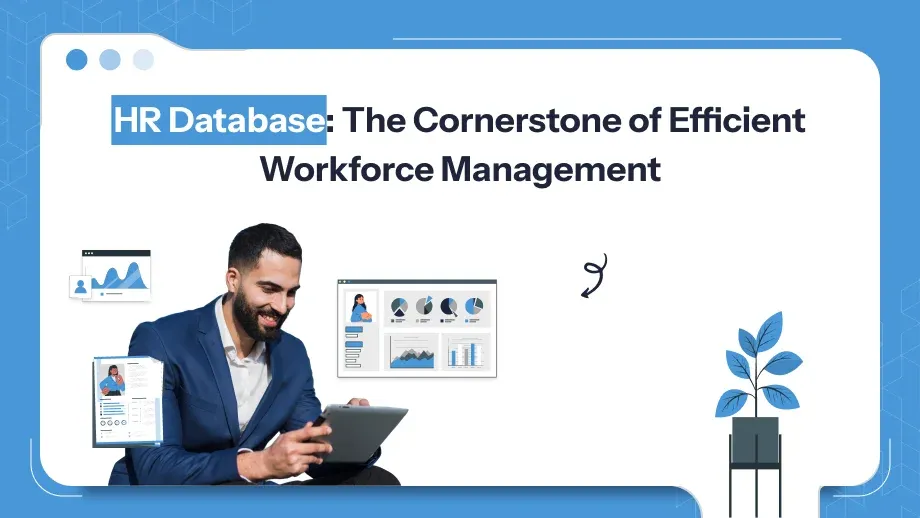
Introduction
Proper workforce management is the fundamental basis of any organization’s success. An HR database is the backbone of successful human resource operations in an organization, providing an integrated system to store, handle, and analyze employee information. Here, we have discussed the components of HR, benefits, challenges, and future trends, focusing on productivity and compliance in an organization.
What Is an HR Database?
An HR database is a program that manages information about employees with a systematic approach. It assists the HR professional in keeping the records organized and cutting down on paperwork as well as decision-making, with reliable and easy-to-access data.
Key Components:
- Employee Details: Name, contact information, job role, department, and emergency contacts.
- Job History: Employment records, performance reviews, promotions, and transfers.
- Payroll Data: Salary, deductions, tax information, and bonuses.
- Attendance and Leave Records: Working hours, leaves taken, and holiday schedules.
- Compliance Documents: Contracts, certifications, and other regulatory files.
- Recruitment Data: Applicant information, hiring statuses, and onboarding progress.
Core Features of an HR Database
Centralized Employee Information
All employee data is stored within a single system, which is secure. Included are personal data, employment history, salaries, and documents relating to compliance. Centralization reduces redundancy, ensures data management in HR accuracy, and makes retrieving information quick and efficient. A single repository helps save time for HR professionals and can focus on strategic initiatives.
Leave and Attendance Management
Leave and attendance management has been streamlined with modern HR databases. These databases automate time-off requests, record work hours, and integrate attendance policies. Integration of biometrics and cloud synchronization makes time-based leave approvals and discrepancies in attendance simpler for HR managers to handle. This increases transparency and assures that the company’s policies are adhered to.
Performance Tracking
Performance reviews and development plans are also maintained in the HR. Thus, it will help HR managers understand employee productivity and performance. Features like goal tracking, automated feedback collection, and performance analytics make it easier to identify top performers, address skill gaps, and plan for employee development programs.
Payroll Integration
Automate payroll processing through salary calculation, tax deductions, and compliance reports. It will reduce errors and ensure timely pay. Additionally, HR often comes with features to generate payslips, track benefits, and manage bonuses, simplifying the payroll process for HR teams.
Compliance Management
An HR database provides a safe, accessible location for compliance-related documents, including contracts, certifications, and legal agreements. Audits are streamlined, and the organization will not be non-compliant with labor laws and industry regulations. The system will also automatically send reminders for renewals of documents and compliance deadlines to reduce administrative work.
Recruitment and Onboarding
HR efficiently manage recruitment pipelines and onboarding processes by tracking applications, monitoring hiring stages, and automating documentation tasks. It simplifies the entire process of hiring, from job advertisements to onboarding evaluations for candidates, and onboarding checklists. This enhances the user experience as well as reduces time-to-productivity for newly hired employees.
Empower Your HR Team with Smarter Solutions!
Elevate your HR processes with an intuitive HR database that drives efficiency and empowers decision-making. See how it fits your needs.
Benefits of HR Databases
Enhanced Productivity
Automating tasks such as payroll and attendance can help HR departments focus on strategic initiatives.
Data Accuracy
Eliminating manual data entry significantly reduces errors, ensuring reliable information for reporting and analysis.
Improved Decision-Making
The data-driven insights gained from HR databases allow HR leaders to:
- Forecast hiring needs.
- Analyze workforce trends.
- Create effective employee development plans.
Employee Self-Service
Many employee database management provide self-service portals where employees can:
- Update their details.
- Submit leave requests.
- Access payslips and tax documents.
Scalability
As organizations grow, HR databases scale to accommodate increasing amounts of employee data, making them future-ready solutions.
Challenges in Implementing an HR Database
Initial Costs
Implementing an HR database requires upfront investment in software, training, and infrastructure.
Data Security Risks
Storing sensitive employee information digitally poses risks of data breaches. Organizations must adopt robust cybersecurity measures.
Resistance to Change
Adopting new technology often meets resistance from employees and HR teams accustomed to manual processes. Proper training can mitigate this.
Continuous Updates
HR laws and company policies evolve, necessitating regular updates to the database to maintain compliance.
How to Choose the Right HR Database
Evaluate Organizational Needs
Consider the size of your workforce and specific HR functions that require improvement. For instance, if recruitment is a priority, a database with strong recruitment database features would be essential.
Prioritize Key Features
Ensure the database includes essential functionalities such as:
- Payroll integration.
- Employee self-service options.
- Data analytics.
Scalability and Flexibility
Select a system that grows with your organization. Cloud-based HRM systems often provide the flexibility and scalability needed for expanding businesses.
Vendor Reputation and Support
Research the vendor’s track record for:
- Customer service.
- Reliability.
- Regular software updates.
Cost-Benefit Analysis
Consider the long-term ROI based on the efficiency improvements and cost savings the database will yield.
Future Trends in HR Databases
AI-Powered HR Tools
Artificial Intelligence is revolutionizing HR database management. It can automate repetitive chores, enhance decision-making as well as provide predictive insights.
- Automated Screening of Candidates: AI can scan through hundreds of resumes, and then select those who meet the criteria that are set out.
- Predictive Analytics: AI allows HR training to anticipate trends in the workforce like turnover rates, or the future requirements for hiring, which will enable efficient scheduling.
- Personalized Employee Experiences: AI-driven tools can recommend personalized training programs, career paths, and performance feedback.
Cloud-Based HR Systems
Cloud-based HR databases are getting increasingly used due to their scale along with their versatility, economy, and flexibility.
- Real-time Data Access: Cloud systems will enable HR teams to access information about employees anywhere, thereby creating collaboration in a hybrid work environment.
- Reduced cost of infrastructure: Cloud-based platforms eliminate the requirement to maintain physical servers which reduces operational costs.
- Improved Data Security: Most recently implemented cloud-based technologies include improved security measures like encryption, and multi-factor authentication that help protect the information.
Mobile Optimization
As remote work becomes standard practice, mobile-friendly HR database systems are essential for ensuring continuous access to HR tools. Features include:
- Apps for Self-Service by Employees: The employees are able to view their pay slips, make requests for leave, and update the information they have on their mobile application.
- Access on the Go: HRs manage all sorts of activities, including approvals, reports, and communication, from their smartphones.
- Improved Employee Engagement: Mobile platforms make HR processes more accessible, leading to higher employee satisfaction and participation.
Advanced Analytics and Reporting
Data analytics is becoming a cornerstone of HR functionality. Advanced analytics tools provide:
- Workforce Insights: Visual dashboards to understand how employees are performing, engaging, and staying in a role.
- Predictive Modeling: Predict future skills deficits or talent leakage through data-based insights.
- Custom Reports: Customize reports to assist with compliance or diversity and inclusion programs.
Integration with Other Business Tools
Future of HR will focus on seamless integration with other enterprise systems such as:
- CRM and ERP Systems: For better alignment between HR, sales, and operations.
- Learning Management Systems (LMS): To link employee training with performance metrics.
- Payroll Software: Ensuring smooth financial processes and compliance.
Focus on Employee Well-Being
With the increasing emphasis on mental health and work-life balance, India HRMS solutions are incorporating features to support employee well-being Examples include:
- Wellness Programs: Track participation in wellness initiatives.
- Feedback Tools: Allow employees to give voice to issues without fear of retaliation.
- Employee Assistance Programs: The HR system contains counseling services and resources.
Conclusion
A vital component of a contemporary business, the HR database manages a company’s people processes more seamlessly, assists it in decision-making, and avoids non-compliance with various governmental regulations. Its implementation enables an effective HR database management system, within any organization by giving it more efficiency as well as maximizing employee satisfaction through a competitive gain.
Advances in technology will bring with them AI integration, cloud-based scalability, and mobile optimization that will continue to reshape the human resource database systems. Whether it is streamlining payroll, compliance, or pipeline management, the right HRMS payroll software in India can make your human resource management practices a powerful driver of business success.









